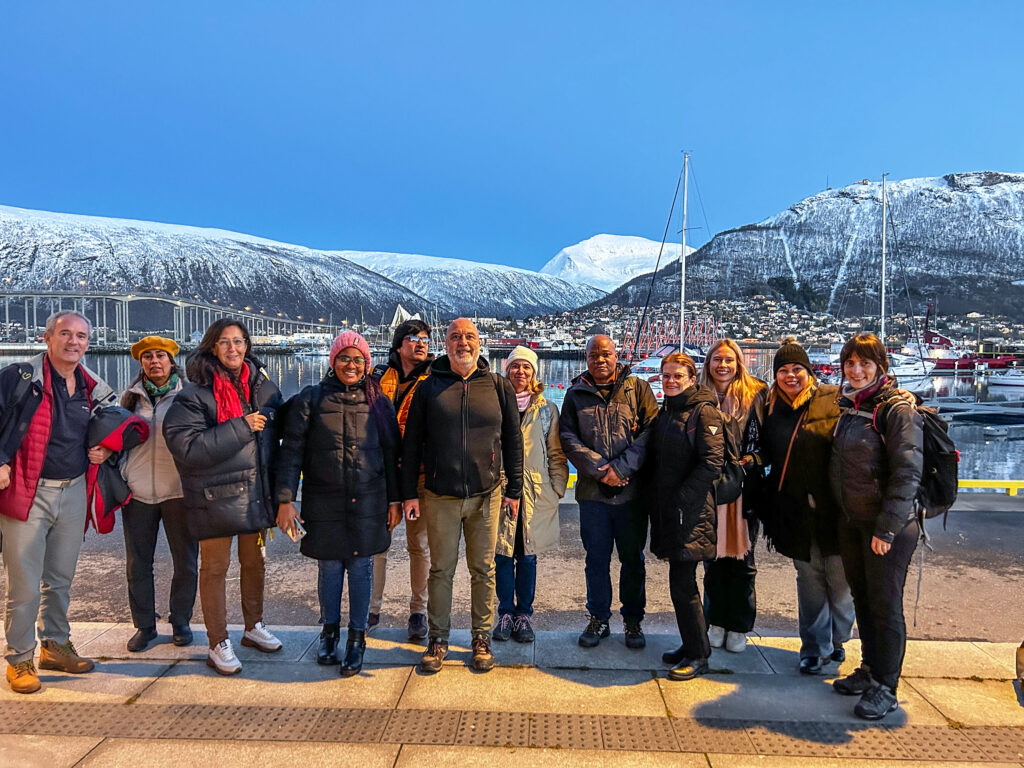The “Blue Route of Discoveries” project, coordinated by the University of Algarve, came to an end this October, with a residential week for doctoral students, entitled “Ocean School: immersion in practice”, and with the official closing event , both at the University of Tromsø – Arctic University of Norway.
The University of Algarve coordinated the Blue Route project between 2021 and 2023: “Preparation of the new Ocean economy – the blue route of discoveries” (PT-INNOVATION-0072 Call 5: Education Blue growth EEA GRANT).
UAlg had the University of Tromsø – Arctic University of Norway as a partner, as well as other national institutions: the Centro de Ciência Viva de Lagos, the Portuguese Institute of the Sea and Atmosphere, the Polytechnic of Leiria, S2AQUA Laboratório Collaborativo, companies such as OLSPS International (Fisheries Management Solutions) and MarTrain (Marine safety).
There were also other academies to participate, such as the Federal Universities of Pernambuco (Brazil), Agostinho Neto, Namibe (Angola), São Tomé and Príncipe, Eduardo Mondlane (Mozambique), Ruhuna (Matara, Sri Lanka) and Nagasaki (Japan) .
The Blue Route project launched an innovative way to support blue growth, through an advanced training platform connected to Moodle UAlg (Electronic Tutoring) in open access, prior distance learning (online teaching), but with a complement to intensive workshops face-to-face (residential module).
The contents of these courses were developed based on the answers obtained in the gap analysis (gap analysis) on the needs of companies and institutions interested in highly qualified human resources in the area of blue growth.
Within the scope of this project, open online training was produced, innovative in the SPOC (Small Private Online Courses) typology, in which each student selected a predefined number of modules, depending on their profile and interest. It was aimed in particular at masters and doctoral students in the area of marine sciences and blue economy.
The project included the production of 10 online modules in English: Entrepreneurship, Blue economy, Sustainable Fisheries (I-Introduction to Ecosystem-Based Fisheries Management and Advice, II-Marine Protected areas and III-Marine Ecosystem Services), GIS applications in Marine Science , Exploring Online Ocean Data and Resources, Science Communication Traceability of Marine Resources , Simulated Virtual Internship – Centro Ciencia Viva Lagos (access as guest). 120 students signed up, of different nationalities (Mozambique, Angola, São Tomé and Príncipe, Sri Lanka, Iran, Pakistan, Germany and Portugal), with the completion rate of activities varying, between 10-50%.
The teaching, despite being online, had a practical nature with the participation of companies, such as OLSPS, which integrated the teaching of sustainable fishing courses, and the company MarTrain, which also taught a hybrid course on safety at sea, with around 50 participants (including students from the University of Namibe).
The residential module, Ocean School, developed in Norway, in Tromso, between 6 and 15 October, with PhD students from Portugal and Norway included a scientific cruise on the UiT research vessel Helmer Hanssen, where aspects of the technology used were demonstrated in sustainable fishing for pelagic and demersal species, such as cod, as well as visits to intensive salmon aquacultures and biotechnology companies that use products of marine origin.
This module also included practical classes ranging from Ocean governance to robotics in the exploration of marine resources.
At the Blue Route closing event, which took place on October 13th, in addition to the UAlg team that coordinates the project, members of the host university, UiT Tromso, the Lagos Science Center, the company OLSPS international (Fisheries Management Solutions), with the remaining partners participating online.
In this modality, the director of Programs and Financing services also joined the General Directorate of Maritime Policy, the managing entity of the EEA GRANT in Portugal. At this meeting, she carried out a global assessment of the project, the successfully tested hybrid teaching-learning model and its sustainability, which opened up opportunities for other areas of knowledge.
Modules produced online will continue to be open access in the coming years, not only for European institutions, but also in developing countries. Thus, we contribute at a global level, through advanced training in different areas of the Ocean economy, which is just one, and towards the sustainable development of coastal areas.



















Comments